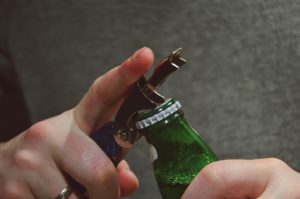
Depression is a mood disorder that is technically referred to as Major Depressive Disorder. It is one of the most common mental health disorders in the United States. Sadly, depression and self-medication are far too often intertwined. The sadness and pain are frequently too much to handle and sufferers resort to self-medicating with recreational drugs and alcohol to deaden the pain.
Depression is often characterized by overwhelming feelings of sadness, isolation, and despair that will last two weeks or longer at a time. Depression affects how individuals think and feel and their daily activities, such as sleeping, eating, or working. [1, 2, 3]
It’s important to note that depression isn’t the occasional feelings of sadness or loneliness, as most people experience these feelings from time to time in their life. Instead, with depression, individuals often feel like they have entered a downward spiral into a dark hole. They cannot see a way out of these dark feelings and may lose hope for things ever to be different. Below are common signs and symptoms of depression: [1, 2]
- Persistent sadness or feelings of “emptiness”
- Feeling hopeless, helpless, or pessimistic
- Feeling guilty or worthless
- Feeling restless or irritable
- Loss of interest or pleasure in hobbies or activities once enjoyed
- Decreased energy, fatigue, or feeling “slowed down”
- Difficulty concentrating, remembering, or making decisions
- Difficulty falling or staying asleep, early-morning awakening, or oversleeping
- Appetite and/or weight changes could be an increase or decrease
- Thoughts of death, dying, or suicide
- Suicide attempts
- Physical symptoms like aches or pains, headaches, cramps, or digestive problems without an apparent physical cause and/or that do not ease even with treatment
Self-Medication
 Given these difficult and painful symptoms, one can understand why an individual struggling with depression would want to “numb out” or find relief from them.
Given these difficult and painful symptoms, one can understand why an individual struggling with depression would want to “numb out” or find relief from them.
This is often done with the use of drugs or alcohol, as these substances are psychoactive and can change our perceptions, moods, emotions, consciousnesses, cognitions, and behaviors.
This use of substances to “numb out” is referred to as self-medicating. In other words, self-medicating with drugs or alcohol can be viewed as an attempt to alleviate or escape depressive symptoms. It may be a way that individuals struggling with depression try to care for themselves.
A 2009 large-scale study of more than 40,000 subjects found that nearly 25 percent of people with mood disorders like depression tried to alleviate negative symptoms with drugs or alcohol. The study also found that men were twice as likely as women to self-medicate. [5]
Another study, conducted on more than 2,000 individuals struggling with depression, highlighted a correlation between those who reported depression and those who also reported opioid abuse. [6] This study suggests that individuals may self-medicate affective pain with opioids. [6]
Individuals with depression who self-medicate with substances are more likely to experience an alcohol or substance use disorder. The coexistence of both a mental health disorder, like depression, and a substance use disorder is referred to as co-occurring disorders.
The Substance Abuse and Mental Health Service Administration (SAMHSA) estimates that nearly 8 million people have a co-occurring mental health and substance use disorder. Furthermore, SAMHSA reports that about 45% of Americans seeking substance use disorder treatment have been diagnosed as having a co-occurring mental and substance use disorder. [3, 4]
Common Signs of Self-Medicating
The following symptoms are common signs that someone struggling with depression may be self-medicating with drugs or alcohol:
- Isolating from family, friends, and social gatherings
- Sudden change in hobbies or social groups
- Increased emotional reactivity, irritability, or anger
- Increased secrecy about how they spend their time
- No longer taking care of themselves, for example not showering, brushing their teeth, or eating
- Changes in sleep and eating habits
- Struggling to meet responsibilities at home, school, or work
- Having new, unexpected, or uncharacteristic financial problems, as this may be due to money spent on drugs and alcohol
 Many of these signs and symptoms are seen with both depression and substance use, which illustrates the complexity of diagnosing and treating co-occurring disorders.
Many of these signs and symptoms are seen with both depression and substance use, which illustrates the complexity of diagnosing and treating co-occurring disorders.
While depression impacts each person differently, the risk of addiction or substance use problems should always be taken into consideration. [3]
Signs that self-medicating with drugs or alcohol may meet criteria for a substance use disorder include the following: [1]
- Spending more time using a substance or using a more significant amount than intended
- Continued use despite social, work/academic, or legal problems
- Experiencing withdrawal symptoms when abstaining or reducing use
- Experiencing an increased tolerance to the substance
- Having strong cravings or desires to use the substance
- Using substances leads to physically dangerous situations (e.g., driving while intoxicated, unprotected sex)
- An inability to stop using despite attempting to do so
Treatment
In cases where an individual may be self-medicating with substances, it is vital that the individual is assessed for co-occurring mood and substance use disorders so that both disorders can be effectively addressed and treated. If both disorders are not addressed, long-term recovery from one or both disorders is less likely. [3, 4]
Sources:
[1] American Psychiatric Association. (2013). Diagnostic and statistical manual of mental disorders (5th ed.). Washington, DC: Author.
[2] National Institute of Mental Health. (2018). Depression. Retrieved from https://www.nimh.nih.gov/health/publications/depression/index.shtml on August 12, 2018.
[3] Substance Abuse and Mental Health Services Administration. (2017). Mental and Substance Use Disorders. Retrieved from https://www.samhsa.gov/disorders on August 12, 2018.
[4] Substance Abuse and Mental Health Services Administration. (2017). Behavioral Health Treatments and Services. Retrieved from https://www.samhsa.gov/treatment on August 12, 2018.
[5] Bolton, J., Robinson, J., & Sareen, J. (2009). Self-Medication of Mood Disorders with Alcohol and Drugs in the National Epidemiologic Survey on Alcohol and Related Conditions. Journal of Affective Disorders, 115(3), 367–75.
[6] Goseling, J., Henry, M., Moser, S., Rastogi, M., Hassett A., Clauw, D., Brummet, C. (2015). Symptoms of Depression Are Associated With Opioid Use Regardless of Pain Severity and Physical Functioning Among Treatment-Seeking Patients with Chronic Pain. Journal of Pain, 16(9), 844–851.
About the Author:
 Chelsea Fielder-Jenks is a Licensed Professional Counselor in private practice in Austin, Texas. Chelsea works with individuals, families, and groups primarily from a Cognitive Behavioral Therapy (CBT) and Dialectical Behavior Therapy (DBT) framework. She has extensive experience working with adolescents, families, and adults who struggle with eating, substance use, and various co-occurring mental health disorders. You can learn more about Chelsea and her private practice at ThriveCounselingAustin.com.
Chelsea Fielder-Jenks is a Licensed Professional Counselor in private practice in Austin, Texas. Chelsea works with individuals, families, and groups primarily from a Cognitive Behavioral Therapy (CBT) and Dialectical Behavior Therapy (DBT) framework. She has extensive experience working with adolescents, families, and adults who struggle with eating, substance use, and various co-occurring mental health disorders. You can learn more about Chelsea and her private practice at ThriveCounselingAustin.com.
The opinions and views of our guest contributors are shared to provide a broad perspective of addictions. These are not necessarily the views of Addiction Hope, but an effort to offer discussion of various issues by different concerned individuals.
We at Addiction Hope understand that addictions result from a combination of environmental and genetic factors. If you or a loved one are suffering from an addiction, please know that there is hope for you, and seek immediate professional help.
Published on October 4, 2018
Reviewed by Jacquelyn Ekern, MS, LPC on October 4, 2018
Published on AddictionHope.com
